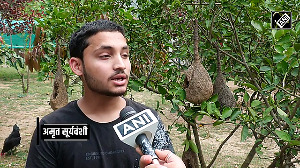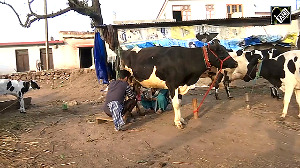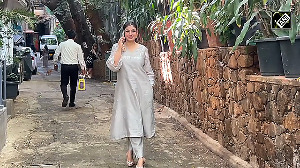"Only take heed to thyself, and keep thy soul diligently, lest thou forget the things which thine eyes have seen, and lest they depart from thy heart all the days of thy life: but teach them thy sons, and thy sons' sons." Deuteronomy 4:9
Sol Teichman, 75, carries this message around the world, telling people about the trauma he and his fellow Jews suffered at the hands of Nazi forces.
A social worker based in Los Angles, Teichman was part of a US delegation in Delhi to organise a photo exhibition on the holocaust.
The exhibition -- 'The Courage To Remember: The Nazi Holocaust 1933-1945' -- started on November 10 and will continue till November 23 at the Indira Gandhi National Centre for the Arts.
Teichman witnessed everything we read in history books -- hunger, torture and death. The 200 photographs that he and his organisation, the Simon Wiesenthal Centre, have brought say it all: heaps of nude bodies dumped in pits lying one over the other; mutilated faces; concentration camps and gas chambers; men, women and children in tattered clothes; and gun-wielding Nazi soldiers.
Teichman has his own story to tell.
The Hungarian army entered his city in former Czechoslovakia in 1935 and plundered the homes and business establishments of Jews. Even as Teichman's parents tried to regain their lost properties, the Germans marched into the city in 1944.
They captured homes owned by Jews and gave them 30 minutes to leave the city, recalls Teichman.
His family was among the hundreds of Jews forcibly taken to Auschwitz. He was 16 then and that was the last time he saw his family members.
"My mother and sister were killed in the gas chamber," he says. "I don't know what happened to others."
They were then sent to Warsaw. The Nazi soldiers asked them to walk to Dachau, a concentration camp. Teichman carried his brother on his shoulders and walked.
In freezing cold, he was made to work for 16-18 hours a day in this concentration camp and that too without food, he recounts.
"We were made to work there for several days and then taken to some other place," says Teichman.
"One day we saw the Germans had left us. There was no soldier. We came out in open to see what happened. The Germans ran away."
Teichman and his fellow Jews kept hiding for few days and were finally rescued by American soldiers. He then migrated to the US.
He says: "I could not believe I was liberated. It was hard to accept that."
Teichman and his family run a shelter home for poor called the Emek Hebrew Academy, The Teichman Family Torah Centre.
He believes hatred, economic crises, human psychology and moral flaws, and complacency and complicity of ordinary people in the persecution of their neighbours are still common.
"We must remember the holocaust and educate people so that it is not repeated," he says.
Teichman first participated in such an exhibition in Tokyo in 1988 and since then has been campaigning around the world whenever he gets time.






 © 2025
© 2025